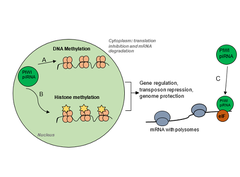Veränderte DNA-Hydroxymethylierung in Down-Syndrom (DS) Patienten [29.05.18]
Eine neue Studie unter Beteiligung von Nicole Breusing vom Institut für Ernährungsmedizin demonstriert erniedrigte Konzentrationen von 5-Hydroxymethylcytosin, TET1 und anderen Komponenten des DNA-Methylierungs- / Demethylierungsapparates im Blut von DS-Patienten. Dies weist darauf hin, dass aberrante DNA-Methylierungsmuster und damit verbundene transkriptionelle Veränderungen auf eine globale Störung der Methylierungskontrolle beim Down-Syndrom zurückzuführen sind. (MARK-AGE Consortium, 2018)Originalstudie
Ciccarone F1, Valentini E2,3, Malavolta M4, Zampieri M2,3, Bacalini MG5, Calabrese R2,3, Guastafierro T2,3, Reale A2, Franceschi C5,6,7, Capri M6,7, Breusing N8, Grune T9, Moreno-Villanueva M10, Bürkle A10, Caiafa P2,3. (2018): DNA Hydroxymethylation Levels Are Altered in Blood Cells from Down Syndrome Persons Enrolled in the MARK-AGE Project. In: Journals of Gerontology - Series A Biological Sciences and Medical Sciences 73 (6), S. 737–744. DOI: 10.1093/gerona/glx198.
- Department of Biology, University of Rome "Tor Vergata," Rome.
- Department of Cellular Biotechnologies and Hematology, Faculty of Pharmacy and Medicine, Sapienza University of Rome, Rome.
- Pasteur Institute-Fondazione Cenci Bolognetti, Rome.
- National Institute of Health and Science on Aging (INRCA), Nutrition and Ageing Centre, Scientific and Technological Research Area, Ancona.
- IRCCS Istituto delle Scienze Neurologiche di Bologna, Bologna.
- Department of Experimental, Diagnostic and Specialty Medicine, Bologna, Italy.
- CIG-Interdepartmental Center "L. Galvani," Alma Mater Studiorum, University of Bologna, Bologna, Italy.
- Institute of Nutritional Medicine (180c), University of Hohenheim, Stuttgart.
- Department of Biology, University of Rome "Tor Vergata," Rome.
- Department of Cellular Biotechnologies and Hematology, Faculty of Pharmacy and Medicine, Sapienza University of Rome, Rome.
Abstract
Down syndrome (DS) is caused by the presence of part or an entire extra copy of chromosome 21, a phenomenon that can cause a wide spectrum of clinically defined phenotypes of the disease. Most of the clinical signs of DS are typical of the aging process including dysregulation of immune system. Beyond the causative genetic defect, DS persons display epigenetic alterations, particularly aberrant DNA methylation patterns that can contribute to the heterogeneity of the disease. In the present work, we investigated the levels of 5-hydroxymethylcytosine and of the Ten-eleven translocation dioxygenase enzymes, which are involved in DNA demethylation processes and are often deregulated in pathological conditions as well as in aging. Analyses were carried out on peripheral blood mononuclear cells of DS volunteers enrolled in the context of the MARK-AGE study, a large-scale cross-sectional population study with subjects representing the general population in eight European countries. We observed a decrease in 5-hydroxymethylcytosine, TET1, and other components of the DNA methylation/demethylation machinery in DS subjects, indicating that aberrant DNA methylation patterns in DS, which may have consequences on the transcriptional status of immune cells, may be due to a global disturbance of methylation control in DS.


